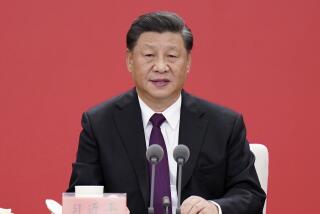China Creates Office to Control All Publishing
- Share via
PEKING — China imposed strict new curbs on the press Wednesday, creating a high-level organization to control all aspects of news and publishing operations throughout the country.
The official New China News Agency said that an office to be known as the Media and Publications Office is being set up directly under the State Council, China’s version of a presidential cabinet.
This office will have responsibility for approving all new newspapers, magazines and publishing houses in China. It will also control the sale of books, magazines and newspapers, supervise distribution of paper and newsprint and “oversee the publication of news.”
The announcement said the office is designed “to facilitate the functioning of the country’s press and publications.”
The new group is apparently aimed at reining in newspapers and magazines that are not directly affiliated with the Communist Party and have in recent years been showing some signs of independence.
Most Are Party Organs
Most of China’s leading newspapers, such as the People’s Daily, the Economic Daily and the Workers’ Daily, are organs of the party and are already directly controlled by the party’s propaganda department. Also, every city and province has its own party publications.
However, China also has some newspapers and magazines that have no formal links to the party. Although these non-party publications generally have party officials working in them, they are not official mouthpieces of the party.
Some of these publications have become increasingly influential. The most prominent has been Shanghai’s World Economic Herald.
Two years ago, the Herald led a successful crusade to persuade the Chinese regime to permit the opening of a stock market in Shanghai. In the past year, the Herald has been the principal outlet for people advocating far-reaching economic and political reforms.
Last September, for example, a theorist named He Xin wrote in the Herald: “In the past, any reference to bourgeois democracy stressed the rights it does not give to the people. No mention was ever made about what it gives. For this country, great publicity is given to what the people receive but never what they are denied. Hence the illusion that China has the best political system in the world.”
In the aftermath of the student demonstrations for democracy that began in early December, the party has launched a nationwide campaign against “bourgeois liberalization.” It ordered all party newspapers to help in this effort.
The new crackdown on the press has already begun to produce some newspaper firings and personnel shake-ups. Last week a local propaganda department appointed new editors for two newspapers in Shenzhen, the border town alongside Hong Kong.
Both papers, the Shenzhen Youth News and the Workers’ News, had published articles by two leading intellectuals, physicist Fang Lizhi and writer Wang Ruowang, who have since been expelled from the party.
Meanwhile, a government spokesman refused to say Wednesday whether Zhao Ziyang, the newly appointed acting head of the party, will be replaced as premier, or head of government.
Acting Party Leader
Zhao became acting party leader Friday when the party leadership accepted the resignation of Hu Yaobang. Hu had reportedly clashed with Chinese leader Deng Xiaoping and other leaders over Hu’s support for greater political liberalization.
Foreign Ministry spokesman Ma Yuzhen told a press conference Wednesday that Zhao is still the premier. Asked whether Zhao would remain premier for some time, the spokesman said he could only speak about the present.
The Foreign Ministry also said that China and the Soviet Union will resume talks on their disputed border on Feb. 9 after a nine-year suspension. The two countries had announced last October that they would return to the negotiating table some time in February.
More to Read
Sign up for Essential California
The most important California stories and recommendations in your inbox every morning.
You may occasionally receive promotional content from the Los Angeles Times.










